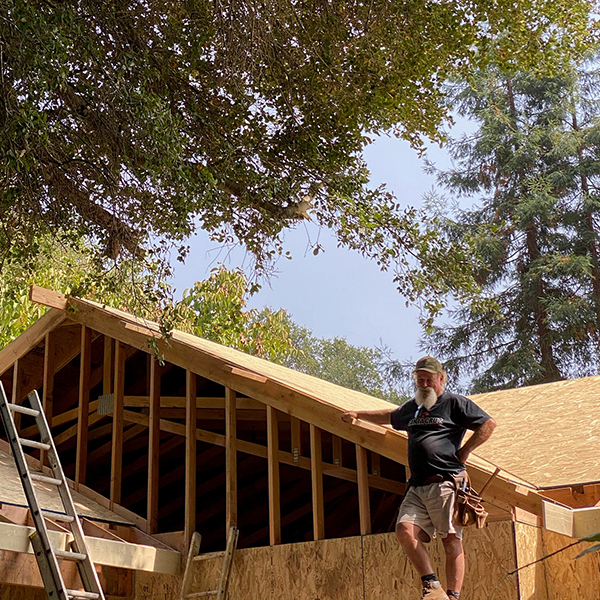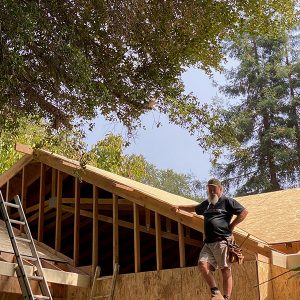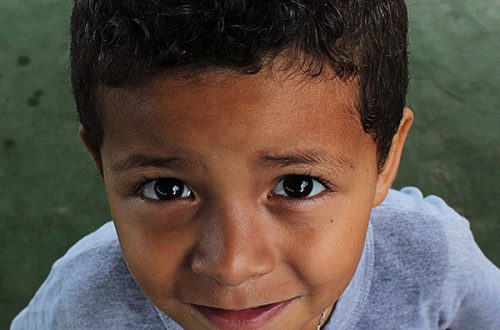
Partnering with Habitat for Humanity
On Accessory Dwelling Units
By Zach Friend, Santa Cruz County Supervisor

 Throughout California there are discussions about how to address the significant affordable housing crisis. The recent fires also highlight the need for displaced residents to have access to safe and affordable housing. Recent studies done on home affordability have shown that in some coastal communities less than a quarter of people earn enough income to be able to purchase a home in their community and many can’t afford rising rents. Our parents and grandparents also are struggling to stay in the homes they own with a rising cost-of-living.
Throughout California there are discussions about how to address the significant affordable housing crisis. The recent fires also highlight the need for displaced residents to have access to safe and affordable housing. Recent studies done on home affordability have shown that in some coastal communities less than a quarter of people earn enough income to be able to purchase a home in their community and many can’t afford rising rents. Our parents and grandparents also are struggling to stay in the homes they own with a rising cost-of-living.
In fact, there are over 15,000 families currently on the Section 8 voucher waiting list locally. Of those who have received housing choice vouchers, over 400 families have been unable to find a landlord willing to accept the fair market rates offered under the program.
There isn’t one simple solution to reducing housing costs. But one promising approach is to increase the number of accessory dwelling units (ADUs). The state (and many local communities) have been working to provide incentives for increased ADU construction. Over the last few years the County has significantly streamlined the process for building ADUs making it easier for homeowners to design, permit and construct these units. Additionally, the Board of Supervisors reduced permitting fees, streamlined the permit process and created a forgivable loan program (that could cover the cost of fees and even construction in some cases) for units that are deed restricted affordable housing units. Put simply, it’s now cheaper, easier and faster to build an ADU in the unincorporated area.
Even with these changes, cost is still a barrier for many people to build ADUs. Habitat for Humanity, in partnership with the State and County, has some programs that could help. Habitat was awarded CalHOME funds from the state of California, which allows more flexible financing for homeowners interested in building an ADU or JADU (Junior Accessory Dwelling Unit) on their property for increased rental income, and creation of long-term affordable housing units.
Habitat offers $100,000 of funding per ADU and doesn’t charge for labor. However, whatever difference there is must be covered by the homeowner, either through savings, equity, or a commercial loan. These funds can cover actual construction costs, as well as predevelopment costs such as architectural, engineering, or legal services; permit or application fees, bonding, site preparation, water or sewer development and more. It is financed as a 30-year low or no-interest loan.
To qualify, households must have incomes at the Low Income, Very Low Income, or Extremely Low Income brackets. Households impacted by an event deemed later as a disaster can have incomes up to 120 percent of these levels as well. For example, the 2020 income limits for two, three, and four-person households are $85,000, $95,600, and $106,200 per year, respectively. That’s 80 percent of the area median income, adjusted for family size. The 120 percent figure for two, three, and four-person households are $105,600, $118,800, and $132,000 per year, respectively.
The homeowner must live on site, but once the ADU is built, the homeowner can continue to live in their home or move into the ADU.
New construction, conversions (of garages for example) as well as rehabilitating, repairing, and reconstructing ADUs are eligible activities. Additionally, these ADUs are not allowed to become short term rentals (vacation rentals).
In addition to the CalHome program, the County is making up to $80,000 available at 3 percent simple interest (deferred for 30 years) as a loan to applicants who agree to make their ADU affordable to those making up to 60 percent of area median income for a specific period of time. Through the “My House My Home” program, the County has partnered with Habitat for Humanity Monterey Bay and Senior Network Services to assist low-income seniors interested in building ADUs to create extra income and remain in their homes. The loan is also payable upon sale or transfer. In exchange for participating in the My House My Home Partnership, homeowners will enter into a deed restriction that will require them to rent the ADU or the primary home at a rent affordable to low income households, defined as those whose incomes are at or below 60 percent of Area Median Income adjusted for household size.
As always, I appreciate any feedback you may have on this (or any other County issue). You can learn more from Habitat for Humanity about these programs by contacting [email protected] or by phone at (831) 469-4663 x14.
I’m maintaining regular updates on social media at www.facebook.com/supervisorfriend and during the shelter-in-place order I’m hosting regular tele-townhalls with County and community leaders on Tuesday nights from 6-7 pm. The call in information for the town halls is 454-2222 with the Meeting ID: 145384# – you are welcome to speak about this issue during the town halls or you can always call me at 454-2200.


You May Also Like

Inside Ed November
November 2, 2020
Wanderlust Family
November 2, 2020

